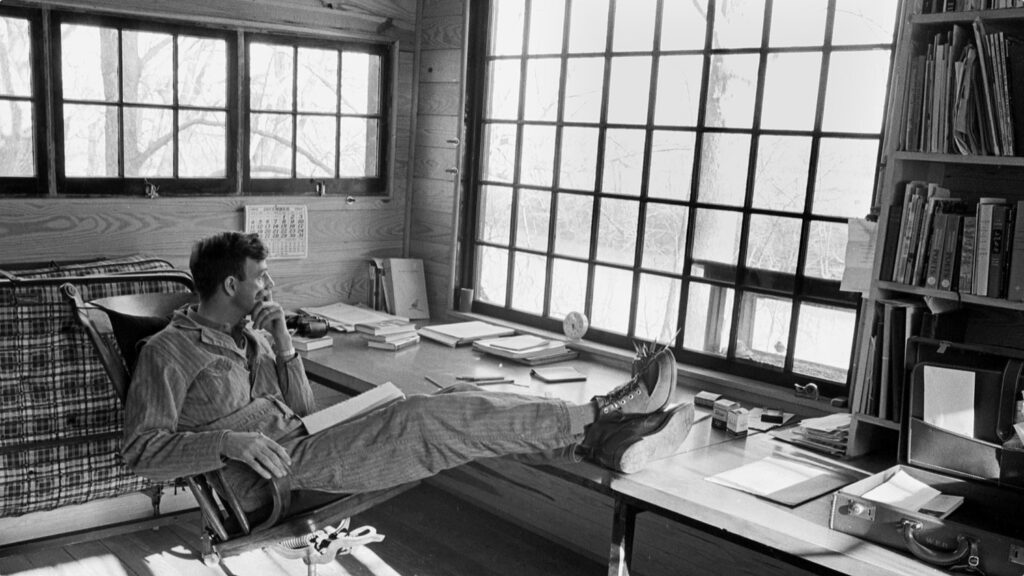Blog Post
Ties that Bind: Wendell Berry, the Bible, and Port William
By Jonathon Van Maren
At the age of 88, Wendell Berry is undoubtedly one of America’s greatest living writers. His canon includes more than two dozen volumes of poetry, nearly 40 works of non-fiction, and a record of the fictional Kentucky community of Port William, based on his hometown of Port Royal and detailed in 12 novels and dozens of short stories. Berry’s work has attracted a profusion of awards including the National Humanities Medal (awarded to him by President Barack Obama) and induction into the Kentucky Writers Hall of Fame. He writes his books in a little writing cabin in the forest fringing his Kentucky farm, and still resolutely rejects much of modern technology.
62 years after the publication of his first Port William novel, the 2022 publication of How It Went: Thirteen More Stories of the Port William Membership brings the saga of the small Kentucky community into the present day, narrated by farmer and agricultural reporter Andy Catlett (a character clearly modelled after Berry himself). All of Berry’s Port William stories feature the rich interior life of its membership as much as what takes place and where, but only an old man could have written How it Went. It features some of Berry’s best passages on the thickness of community rooted in place and the relationship between the land, the living, the dead, and the unborn:
Memories of times and places he had forgotten came back to him, reached him at last as if they had been on their way for a long time. He realized how fully and permanently mere glances, touches, passing words, from all his life far back into childhood, had taken place in his heart. Memories gathered to him then, memories of his own, memories of memories told and retold by his elders. The wealth of an intimate history, belonging equally to him and his ancestral place, welled up in him as from a deep spring, as if from some knowledge the dead had spoken to him in his sleep.
Having grown up with the King James Bible, the first thing I noticed when I began reading Berry’s Port William stories is how interwoven they are with its cadences. His intimate knowledge of this greatest of English Bibles would not have been remarkable when Nathan Coulter was published in 1960; now, one wonders how many readers actually recognize Berry’s references. The concept of “the membership” itself was described by Burley Coulter in Wild Birds this way: “The way we are, we are members of each other. All of us. Everything. The difference ain’t in who is a member and who is not, but in who knows it and who don’t.” Berry took that concept from 1 Corinthians 12: 12: “For as the body is one, and hath many members, and all the members of that one body, being many, are one body: so also is Christ.”
The phraseology of the King James is pervasive throughout the Port William record. Berry refers to “groaning and travailing” (Rom: 8) in A World Lost; he describes Andy’s amputated hand as a “help meet” that he misses like “Adam missed Paradise” in Remembering, and Elton Penn’s wife as a “help meet” in How It Went (Gen: 2); Hannah Coulter describes the membership as “those in whom we live and move and have our being” (Acts: 17). Those are just a few of many examples. And there is Berry’s haunting description of the flooded river in Jayber Crow, in which the titular character finds his thoughts shaped by the Scriptures he’d been weaned on:
And this is what it was like—the words were just right there in my mind, and I knew they were true: “the earth was without form, and void; and darkness was upon the face of the deep. And the Spirit of God moved upon the face of the waters.” I’m not sure that I can tell you what was happening to me then, or that I know even now. At the time I surely wasn’t trying to tell myself. But after all my years of reading in that book and hearing it read and believing and disbelieving it, I seemed to have wandered my way back to the beginning—not just of the book, but of the world—and all the rest was yet to come. I felt knowledge crawl over my skin.
As foreign as it is to the post-Christian reader, the consciousness and common parlance of the average American was once shaped by the King James Bible, which was a fundamental part of daily life for centuries. Even non-Christians—and there were plenty of those in Port William, too—would have recognized its phraseology without really noticing it because everyone did. It was the lens through which millions of Americans experienced life. Today’s largely illiterate generations do not know what they do not know. Reading Berry’s stories is a reminder, especially because he almost never quotes the Bible directly—his characters simply make use of its poetry and phrases because it is a part of the cultural air they breathe. Most people would have used passages of Scripture without being able to tell you where the text could be found or where they’d heard it first. Back then, they might have heard it anywhere.
Berry, of course, is nearly 90 and came of age in that culture. I wrote him a letter to ask if he was ever concerned that readers are losing not only the cultural context for his stories, but knowledge of that cultural context. Our current social imaginary, after all, is almost entirely devoid of Scripture. “The Bible is important to me,” he wrote back. “The King James Version is important to me because of its beauty, and because it was the Bible for every English-speaking reader for over 400 years. Most people now don’t know the Bible in any version, nor will they recognize other references to work in our literary tradition. That is a worry, of course, but there is no reason that my writing should be influenced by the ignorance of readers.” (To which the reviewer can only reply: Amen.)









I thought I remember you reporting Berry agreed to an interview with you? I’ve been waiting months. Maybe I misremembered?
Recently picked up “The World Ending Fire” which I am enjoying. I am powerfully drawn to Berry’s writing, for reason’s similar to what you articulate here. I look forward to King Jesus return and the culmination of Psalm 72 which I think Berry taps into.
No, never wrote that! I’d love to have one, of course. Thanks for the kind comment!